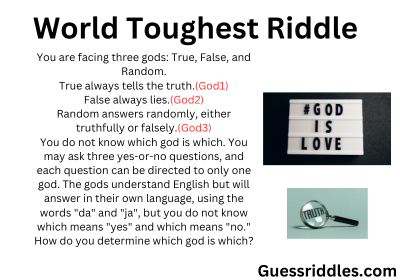Answer :
This is a brutal logic puzzle, but here’s the solution broken down step by step:
Step 1: Understanding the Challenge
- You have three gods (True, False, and Random), but you don’t know who is who.
- You can only ask three yes/no questions.
- The gods will answer with “da” or “ja”, but you don’t know which means “yes” or “no”.
- True always tells the truth.
- False always lies.
- Random answers randomly.
The challenge: Figure out which god is which despite these complications.
Step 2: Key Insight – A Self-Referential Question
To overcome both the lying and the unknown language, we need to construct a self-referential question that guarantees a consistent answer.
The Trick:
Use a question of the form:
“If I were to ask you X, would you say ‘da’?”
This works because:
- If you ask True, he will answer correctly.
- If you ask False, he will lie about what he would say.
- If you ask Random, well… we’ll deal with him later.
Using logical negation, the question forces both True and False to answer in a way that allows us to deduce the real answer, even if we don’t know what “da” and “ja” mean.
Step 3: First Question – Identifying One God Who Is Not Random
Pick any god and ask:
“If I asked you, ‘Is the god on my left Random?’, would you say ‘da’?”
- If the god is True, he truthfully tells you what he would say.
- If the god is False, he lies about what he would say.
- This guarantees that the response follows a pattern where we can interpret it correctly.
- If you get an inconsistent response (e.g., it varies when asked again), you’re talking to Random.
From this, you can identify one non-Random god (either True or False).
Step 4: Second Question – Finding Out If This God Is True or False
Now that you have a non-Random god, ask them:
“If I were to ask you, ‘Are you True?’, would you say ‘da’?”
- If they are True, they answer truthfully.
- If they are False, they lie about their answer.
Either way, you now know whether this god is True or False.
Step 5: Third Question – Identifying the Third God
Now you know who True or False is. You also already found Random in Step 3. That means the last god must be the one you haven’t identified yet.
Final Answer
By carefully structuring your questions, you can logically deduce the identity of all three gods without needing to know whether ‘da’ means yes or no! This makes the puzzle one of the hardest because it forces you to navigate lies, randomness, and an unknown language all at once.
show less

